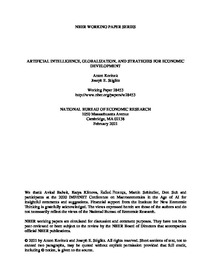Artificial intelligence, globalization, and strategies for economic development

Korinek, Anton ; Stiglitz, Joseph E.
NBER - Cambridge, MA
2020
42 p.
artificial intelligence ; automation ; technological change ; economic policy ; governance
NBER Working Papers Series
28453
Technology
https://doi.org/10.3386/w28453
English
Bibliogr.
"Progress in artificial intelligence and related forms of automation technologies threatens to reverse the gains that developing countries and emerging markets have experienced from integrating into the world economy over the past half century, aggravating poverty and inequality. The new technologies have the tendency to be labor-saving, resource-saving, and to give rise to winner-takes-all dynamics that advantage developed countries. We analyze the economic forces behind these developments and describe economic policies that would mitigate the adverse effects on developing and emerging economies while leveraging the potential gains from technological advances. We also describe reforms to our global system of economic governance that would share the benefits of AI more widely with developing countries."
Digital
The ETUI is co-funded by the European Union. Views and opinions expressed are however those of the author(s) only and do not necessarily reflect those of the European Union or the ETUI.